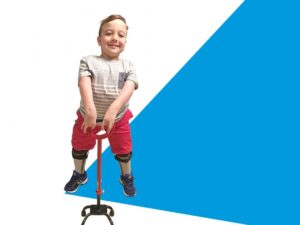For exceptional children with physical or cognitive struggles, achieving goals is paramount. The road to these achievements can be long and bumpy, though. Children who experience daily obstacles often face discouragement. They tire of the pain, the effort, the trying. Not only do the children suffer from dejection, but the parents of exceptional children can also encounter similar defeat. How do they motivate their child despite their own emotional struggles?
They use a combination of sources like behavior plans, social media, shared goals, small rewards, and serious celebration.
Local mom, Doris Heckert, knows the struggle and the triumph well. She and her husband, John, work very hard to encourage their son, Jackson, to achieve the impossible. Jackson was born with Arthrogryposis Multiplex Congenita, which is a condition that causes many joints to be stiff and crooked at birth. Any and all joints can be affected, which can drastically affect the most simple tasks. Jackson’s prognosis at birth was bleak, and the Heckerts were told that if he lived, he would be limited to a crib. Nine years later, Jackson is a brilliant and involved kid who enjoys playing sports with Courageous Kids, an inclusive sports league, and “running” with his mom as a “rider.” In addition to his many activities, Jackson goes to therapy, uses a walker and braces, and struggles to complete basic tasks that many of us take for granted. Doris encounters resistance consistently when she encourages him to try walking and other independent skills. He is nine, after all, and lives in a body that does not do what his mind tells it to.
Doris confesses, “Walking has been our biggest battle.” The Heckerts’ main goals for Jackson are that he walks and that he can take care of himself independently. These goals require great effort and energy of Jackson, however. He expresses his opinion strongly and displays his fierce will when he does not want to try. After a difficult year of fear, a fractured hip, and some defiant behavior, Jackson was really struggling. The family saw a social worker, which has made a world of difference.
Behavior Plans
The social worker introduced a smart discipline behavior plan. In this plan, the child and the parents work together to create boundaries and consequences. Making choices and decisions gives the child ownership and a voice. Social worker Charlene Lilly, an LPC, agrees, “This is a huge motivator for a child with special needs, as they are rarely in charge of anything. Having some control is important.” The Heckerts applaud this system and have observed the benefits of the boundaries.
Social Media
Social media and YouTube can be huge factors of motivation. Kids love watching videos of other children like them doing awesome things. Jackson is no different. He takes great joy in watching other kids like him succeed and accomplish their goals. Because his diagnosis is rare, his interaction with kids like him is limited to social media and attending a national conference once a year. Doris explains that not only does Jackson get motivated seeing other kids succeed, he is also motivated when he can show others what he’s accomplishing. Videos and pictures can be used as motivation both ways: to inspire the child so they then can inspire others.
Shared Goals
Another powerful motivational tool can be shared goals. When parents join in on the challenge, the child can feel supported and not alone. Doris and Jackson challenged each other this past spring through the organization Ainsley’s Angels. This organization pairs “athlete riders” with “angel runners” so that exceptional children can feel what it’s like to race. Doris and Jackson made a deal. Doris explains, “He would walk every day, I would run every day, and at the end of March, we would run a 5K together.” And they did! The mom and son team finished the 5K in 35 minutes. Shared goals can inspire the child to keep working as well as keep the parent involved in their progress.
Small Rewards
Lilly suggests, “When a child with special needs is at an impasse, small/short term rewards work best.” Get creative in what those small rewards can be, but “start small and build on success.” And what goes best with rewards? Celebration!
Celebration
Celebration is one of the most fun ways to motivate a child with special needs. A parent should be the biggest cheerleader for his or her child. Doris agrees, “When he does get it right, I cheer and throw the biggest party.” The victory can be small or large, but the heart of the party should always be huge.
While exceptional parents bear a heavy load, they also experience joy. They are strong and resilient, fighting passionately for the best life for their children. Even when despair creeps in or frustration rises up, these parents choose to keep going, to keep motivating, and to keep encouraging their exceptional kids. ■





